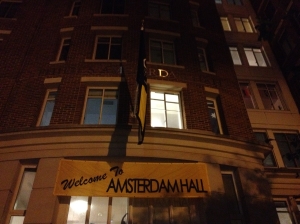By lizalunstroo
An unconventional title – coming from the patriot I am (not really). I am not the first to say that the Americans can learn a whole lot from the Dutch, but I would really like to tackle the same issue from the opposite angle. Since my arrival in the US six weeks ago, I have visited no less than 10 states, and naturally, D.C. too. The lasting impression that I acquired in those weeks traveling around, was a feeling of being welcome – the natural state of each American is to say ‘welcome’ to each foreigner that roams their country. Now, this state is not something that the Dutch have managed to attain too successfully, and in my opinion, accomplishing this would greatly enhance our country’s international image.
Traditionally, the Netherlands was a country of refuge to people who were frowned upon in their own country because of their different opinions, such as Spinoza and Descartes. I do not mean to bore you with history lessons about the Dutch Golden Age [seventeenth century, roughly], but the point I want to make is that the attitudes of the Dutch people have changed a great deal since then. Recent monitors in Maastricht (where my home university is located) among foreign students show that they do not feel very welcome, and that it can certainly feel as if people would rather see them go than come. Other reports and monitors show that they feel culturally marginalized by the municipal government, expats feel unwelcome, language barriers form significant obstacles and different population groups do not mingle well. Of course, this only pertains to Maastricht, and becomes an immense generalization if applied to the rest of the country. Recent national election polls show, however, that 13% of the population will vote for the most right-wing party the Dutch currently know, the PVV. This party advocates a stop to immigration and a withdrawal from the European Union, a proposition that should already give you an indication of how idiotic and populist this party aims to be, but let me not digress from my initial subject.
For me, the last few weeks have been a breath of fresh air, from the security guy at DC’s airport welcoming me, to neighbors on the campgrounds, to the cashiers in supermarkets who wondered where I was from and, upon hearing the answer, immediately welcomed us wholeheartedly, to the people that I meet daily at this university. This attitude makes me feel welcome, truly.
Label: Amsterdam Hall – my current home
Now, I do not want to look down on the Netherlands quite so harshly as it might have come across earlier. Of course, in general, I do not believe that foreigners in the Netherlands feel particularly unwelcome, I just believe that we could make them feel more welcome than they might feel at the moment, through having a more open-minded attitude than usual. What is the point of that? The point is that it makes the transition from one culture into another a lot easier and more pleasant, something I can already fully support through experiencing this myself. Also, in the long term, it makes people more aware of the new cultural habits and in turn, this might encourage them to become an active participant in civil society. Like I said, my arrival and subsequent stay in the US has been one of a true welcoming spirit, and any daring student encountering a different culture and country deserves the same treatment. That is why I chose this title, and that is why the Dutch can learn from the Americans.
P.S. Disclaimer (how American!): I do love the Netherlands, and people should definitely come visit. Also, whenever I speak to people here in the US that have been to the Netherlands, they are very positive about the Dutch. We have beautiful canals, buildings, history and in general, people are not so mean as you might think after reading this.

